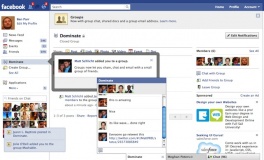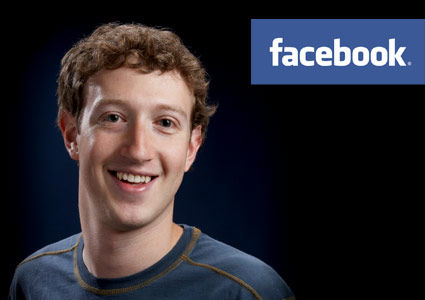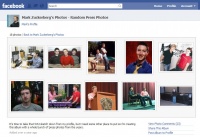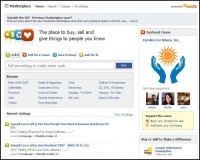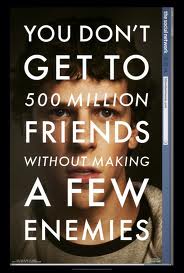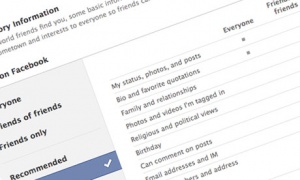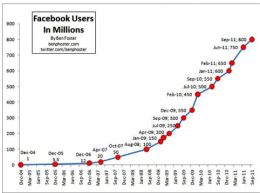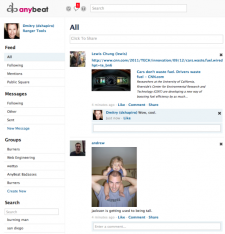| Community | anyone who creates an account |
| Membership | open, free, registered |
| Privacy | features that support privacy |
| Self Identity | Profile, Photos, Friends, "Likes" |
| Features | Sharing Photos, Online Chat, Wall |
| Status | |
| Launch Date | February 4, 2004 |
| Users | 1 billion |
Contents
History
Harvard
Mark Zuckerberg developed a site called "Facemash" while he was an undergraduate at Harvard. The site displayed four photos of Harvard University students, two males and two females, and prompted the user to vote on who was "hotter".[2] The popularity of this site inspired Zuckerberg to create another social website called thefacebook.com. It launched in February of 2004 and was exclusively for Harvard students. The website immediately became popular, with almost half of Harvard students registering for the site within the first month it was active.
Despite the site's immediate success, Zuckerberg still had issues to deal with concerning the creation and inspiration of thefacebook.com. After the site launched, three other Harvard students, Cameron Winklevoss, Tyler Winklevoss, and Divya Narendra, accused Zuckerberg of misleading them, as he had agreed to help build them a similar website, "Harvard Connection". This, along with the influence of the film, The Social Network, lead the Winklevoss twins to pursue a lawsuit claiming that Zuckerberg stole their idea to create Facebook. In 2008, the Winklevoss twins decided to end their lawsuit and accepted a $65 million settlement, composed of $20 million cash and a share of Facebook stock worth $45 million at the time. The twins' stock is now estimated to be worth over $150 million.[3]
Expansion
One month after thefacebook.com was launched at Harvard, Zuckerberg expanded registration to Columbia University, Yale University, and Stanford University. Shortly after these universities were added, registration began to open for other colleges and universities. In 2005, Zuckerberg dropped "the" from the name. In September 2005, registration became open to all high school students, though it required an invitation to join. Facebook kept expanding, until September 2006 when it was opened up to anyone over the age of thirteen with a valid email address.
Initial Public Offering
Facebook received its IPO (Initial Public Offering) on May 18, 2012. This was one of the largest IPOs in history, capitalized at over $104 billion, with an opening price of $38.00 a share. By Friday October 26, 2012 this price had dropped to $21.94 a share.[4]
Facebook Features
Through their profiles, Facebook users are able to share their photos, interests, and personal information with their social network. Users are able to communicate with each other by posting publicly on the walls of Facebook friends, sending private messages to other users and chatting with their Facebook friends through Facebook chat or messages in both text and video.
- Some Common Facebook Features
| Connecting with Other Users | |
| Friending | Friending is the act of connecting with someone through Facebook. Users can either can find people to connect with be searching for a name or email address, being recommended by other friends, or having Facebook suggest friends for them. After a user is sent a friend request, the user can choose to accept or deny this request. Users are also given the option to sort their friends into a categories, such as "family", "co-workers", "housemates", etc. If a user later decides they no longer want to be friends with someone, they have the option of de-friending them. Users may also block their friends from viewing their profile or being able to look them up. |
| Facebook Wall | The main page of a user's profile is called the Wall. This is where anything the user posts (links, photos, status updates, etc.) is shown. Other users may also post public messages on a friend's Wall. The message can be text, a photo, a video, or a link, and is visible to anyone who is friends with the user on whose wall it is being posted on. The user may choose to hide certain stories or categories of stories from others of their choosing. Users can also the ability to comment or "like" posts that are found on their friends' Facebook Walls. Recently, the Facebook wall was changed into a timeline. |
| Facebook Timeline | The Facebook Timeline is a drastic redesign of the previous Facebook wall. The beta version of this feature was available as early as September of 2011, and in December, Facebook began to roll out Timeline to the general public. Timeline is a new feature that turns a user's wall into a virtual scrapbook. It keeps track of all the user's activity on Facebook and organizes them in chronological order. Instead of a having events arranged in a single column, events are arranged in two columns, with the option to highlight certain posts. When Facebook users visit a friend's timeline, Facebook will automatically highlight specific aspects of that person's life. Individual users are also able to edit which specific events they want to highlight in their life. Featured items are expanded to span the entire width of the timeline. Additionally, users have the ability to add previous events to their timeline, such as births, vacations, learning new skills, and other significant events. Many people are concerned about this new feature because of the inherent privacy issues it creates. Additionally, Facebook users have historically been resistant to changes to the basic layout of the Facebook profile. Another major change to Facebook with the creation of Timeline is the larger integration of media into the Facebook profile. Instead of only a profile picture, Timeline incorporates a cover photo. The cover photo is a larger photo that is usually the first thing seen when a person looks at a Timeline. With the change to Timeline, there is also less personal information displayed on a user's page. The Timeline also makes it easier to find old posts because of the toolbar on the side of the Timeline which allows users to jump to a specific year or month. |
| Facebook Chat | Facebook chat is similar to other instant messaging platforms, such as AOL AIM, MSN Messenger, and Google Talk. Users are able to chat one-on-one with others, or form chat groups with multiple users. There are also mobile applications that allow Facebook to forward messages to users' mobile devices, even if they are not logged into Facebook. Even without a mobile application, chat messages can be sent to an offline user; they will simply be sent to the user's inbox. Recently, Facebook partnered with the video chat service Skype to allow users to video chat through Facebook. |
| Messaging | Facebook allows its users to send private messages to each other through an inbox function. This is similar to the chat application, except the message appears in an inbox rather than a chat window. As with Facebook chat, users can also send group messages. Messages are sent privately, and are only view-able by those to whom they are sent. It is also possible for users to send messages to those they aren't friends with, as long as the person's privacy settings are set to allow messages from non-friends. |
| Comments and Liking | Users comment on things by writing a response to a status, photo, or anything else shared on the site. Users can also "like" elements on the site as a form of commenting. |
| Tagging | Users have the ability to tag their Facebook friends in status updates, wall posts and other posts. When tagging was first introduced, users had to include the "@" character before the friend's name, but now it is possible to tag someone simply by typing their name. Tagging is used to make sure that a specific friend notices that something is posted. However, the tags are not permanent; users have the ability to "untag" themselves if they do not want to be associated with the post. |
| Poking | Facebook also allows its users to "poke" other users. When poked, users are given the option to poke back, or to simply ignore the poke. Zuckerberg described the poke function as follows: "When we created the poke, we thought it would be cool to have a feature without any specific purpose. People interpret the poke in many different ways, and we encourage you to come up with your own meanings".[5] Some users can engage in what they call "poke wars" and poke each other until one user decides to stop. |
| Groups | Facebook allows its users to form groups in which comments, messages, links, videos, and photos can be posted. Privacy settings allow users to control which people have access to the group and which people are able to post to the group. Users can belong to up to 300 different groups. People use groups for school clubs, groups of friends, class projects, and other communities. |
| Connecting with Other Users | |
| News Feed | The news feed appears on the homepage of Facebook after the user logs in. It contains an up-to-date thread of the user's Facebook friends' recent activity. The news feed also contains upcoming events, friends' birthdays, and changes to users' profiles. A recent update allows users to swap between top stories and recent stories. Recent stories shows a chronological list of a user's friends' actions, while top stories shows the most popular stories based on the number of comments and likes. Users are also able to mark or un-mark stories as being top stories. |
| Status Updates | A status update is a message composed by a Facebook user that gets posted on the user's timeline, and shows up in friends' news feeds. The original use of status updates was to inform people of what a user was doing or feeling at a particular time. However, status updates have evolved to be more broad - not just statements of feeling. Originally, status updates would read: "[user name] is ___", but as they have evolved, the "is" was dropped, allowing the user to speak in the first person. |
| Photos | Facebook is currently the largest online photo hosting website. It allows its users to upload photos and create photo albums that can be viewed on their profile. Users can tag friends in their photos, so they will also appear on the tagged users' profiles. Photos can also be shared on other users' profiles, even if they themselves are not in the photo. If a user is unhappy with a photo, they can untag themselves from the picture. With the Timeline feature, users can opt to "hide" their tags on photos as an alternative to untagging. With this feature, the photo is removed from the users profile, but their name is still included under "tags" for those who view it on another person's profile or in an album. |
| Like Pages | Like Pages on Facebook range from topics of interest to places to people to ideas. When a user likes a page, they become a fan of that page. Owners of Like Pages are able to access information about their fan base, similar to Google Analytics. Like Pages can have an infinite number of fans, whereas a single user's profile can only have 5,000 friends. Users' liked pages will show up in their profile under interests. Like Pages are also now known as "Fan Pages", and are used by many companies as a method of advertising. Studies have shown that people who like a corporation on Facebook are more likely to purchase their products. Companies like Delta and Victoria's Secret even provide a feature to purchase gift cards or book flights through their Facebook page. They also let people share their purchases with their friends, which can also help companies gain more business.[6]. |
| Frictionless Sharing | Frictionless sharing integrates third-party products with Facebook, and shares information between them. For example, connecting Spotify to Facebook allows users to see their Facebook friends' playlists within Spotify, in addition to allowing users to post what songs they are listening to. In December 2011, along with Timeline, frictionless sharing was introduced.[7] Critics of this feature claim that Facebook does not give users enough control when deciding how they'd prefer to use frictionless sharing. |
| Other | |
| Notifications | Facebook users can access their notifications from a button in the upper left hand corner of the page. Users are notified whenever there is new activity concerning them on Facebook, such as someone accepting a friend request, being invited to an event, someone posting to their wall or a group they belong to, being tagged, or someone commenting on something they have posted. Users are able to select what type of notifications they wish to receive and can opt for notifications to be sent to their email account or mobile phone. |
| Applications | Facebook developed applications include: Events, Photos, Videos, Marketplace, Notes, and Places. The events application allows users to create events, customize the descriptions and associated photos, and invite friends. The Photos and Videos applications allow users to upload their photos or videos for other users to see, comment on, and like. Marketplace provides a free and accessible place where users can post ads for housing, jobs, and other miscellaneous objects. The Notes application is similar to a blog, where users can post notes for their friends to see. Notes are usually of a more personal and reflective nature than status updates or wall posts. The Places application allows users to check-in at locations, and has become more popular as the mobile Facebook application has taken off.[5] |
Cultural Influence
The Social Network (Film)
On October 1st, 2010 the movie The Social Network, directed by David Fincher and starring Jesse Eisenberg as Mark Zuckerberg, was released.
The film follows the beginnings of Facebook and the legal disputes that occurred because of the site. Beginning in Zuckerberg's Harvard dorm room, the Social Network follows Zuckerberg as he pieces together the technical and logistical components behind his social networking site. As Zuckerberg develops the platform; expanding on his original idea and "borrowing" a similar networking site plan from the Winklevoss twins, before setting up the official business on the West Coast. As Zuckerberg meets Sean Parker, Napster's founder, he becomes alienated from his friends and later finds himself in multiple lawsuits.
The cast includes: Jesse Eisenberg (as Mark Zuckerberg), Andrew Garfield (as Eduardo Saverin) and Justin Timberlake (as Sean Parker)[8].
The film was a blockbuster success, raising over 224,920,315 USD at the box office. The Social Network also won several awards, including Oscars for Best Achievement in Film Editing, Best Achievement in Music Written for a Motion Picture, and Best Writing for an Adapted Screenplay.[9] The movie was based off of the book Accidental Billionaires, by Ben Mezrich, and although no one involved in the development of Facebook was consulted on the script and production of the movie, Eduardo Saverin was a consultant for Mezrich's book.
Societal Effects
Zuckerberg has stated that he has received many messages from people who have been inspired to take a greater interest in computer science, or to start their own companies after seeing the film.[10]
Ethical Concerns of Facebook
Privacy
There are many privacy concerns surrounding Facebook. For example, people have argued that the safety of the user accounts is frequently compromised. Additionally, Facebook has faced lawsuits over source code and intellectual property.
In July 2011, German authorities began to discuss the prohibition of events organized on Facebook. This decision was based on several cases of overcrowding due to people who were not directly invited finding out about events on Facebook. In one instance, after reports of overcrowding, more than a hundred police were deployed for crowd control, where a police officer was injured and eleven participants were arrested for assault.[11]
Facebook also has certain privacy controls to help users stay as anonymous as possible on Facebook. These include but are not limited to:
- Users can control who can see certain aspects of their profile
- Users can control which of their photos are visible to others
- Users have the ability to de-tag photos
- Users can control who is allowed to comment on and like things they post
- Users can control which of their stories get published to the newsfeed
- Users have the ability to delete posts from their profile
- Users have the ability to appear as "offline" on Facebook chad
- Users have the ability to be unsearchable on Facebook
Settings and features change frequently, often on a weekly basis, but users are not always aware of the changes and some remain ignorant to control how much information they share via their Facebook profile.
Data Mining and Transparency
It is unclear what information Facebook collects from their users and what they do with this information, though many users have noticed personalized adds on the site. It is also unclear with whom Facebook is sharing the information they gather. Facebook does not notify the user when their data is collected or used with third-partys because Facebook has the right to the information on the site. Many websites are also moving towards a log-in and commenting systems that utilize Facebook. While these pages are designed for easy user access, they also allow websites and companies to engage in data mining without consent from the user. If Facebook users have lenient privacy settings, it would be easy for external websites to gather information about these users.
Third-Party Applications and Data Sharing
Third-party applications are not allowed to sell the personal information they collect. Facebook’s Special Provisions Applicable to Developers/Operators of Applications and Websites clause states: “You [third-party applications] will not sell user data”.[12] However, the top ten third-party applications on Facebook disregarded this clause in 2010 and were caught selling personal information to data brokers by the Wall Street Journal.[13] The top three applications at that time were FarmVille with 59 million users, Phrases with 42 million users, and Texas HoldEm Poker with 36 million users.[14] From these top three applications alone, a minimum of 36 million users’ information was sold to at least 25 advertising and data firms.[13]
Facebook Advertising
Facebook has worked in conjunction with Datalogix, a data-mining company that collects sales information from physical retail stores. In order to demonstrate the effectiveness of targeted advertising, Facebook asked specific advertisers to show advertisements to targeted groups of people, and Datalogix verified whether or not users in this targeted group purchased the product. Of the 50 different advertisements Facebook tested, roughly 70% of the time, every dollar spent on advertising resulted in three dollars in sales.[13] Although this data illustrates the effectiveness of targeted advertising, Facebook’s willingness to hand over user information to Datalogix and advertising companies is still unsettling for many users.
Federal Trade Commission
On November 29, 2011, Facebook and the Federal Trade Commission came to an agreement regarding the protocol of protecting users' rights to privacy. The settlement addressed concerns that Facebook was not upholding "the promises about privacy that it makes to its hundreds of millions of users".[15]
- Complaints
- In December 2009, Facebook changed its website so certain information that users may have designated as private – such as their Friends List – was made public. They didn't warn users that this change was coming, or get their approval in advance.
- Facebook represented that third-party apps that users' installed would have access only to user information that they needed to operate. In fact, the apps could access nearly all of users' personal data – data the apps didn't need.
- Facebook told users they could restrict sharing of data to limited audiences – for example with "Friends Only." In fact, selecting "Friends Only" did not prevent their information from being shared with third-party applications their friends used.
- Facebook had a "Verified Apps" program & claimed it certified the security of participating apps. It didn't.
- Facebook promised users that it would not share their personal information with advertisers. It did.
- Facebook claimed that when users deactivated or deleted their accounts, their photos and videos would be inaccessible. But Facebook allowed access to the content, even after users had deactivated or deleted their accounts.
- Facebook claimed that it complied with the U.S.- EU Safe Harbor Framework that governs data transfer between the U.S. and the European Union. It didn't.
The proposed settlement bars Facebook from making any further deceptive privacy claims, requires that the company get consumers' approval before it changes the way it shares their data, and requires that it obtain periodic assessments of its privacy practices by independent, third-party auditors for the next 20 years.
- Settlement
- Specifically, under the proposed settlement, Facebook is:
- barred from making misrepresentations about the privacy or security of consumers' personal information;
- required to obtain consumers' affirmative express consent before enacting changes that override their privacy preferences;
- required to prevent anyone from accessing a user's material more than 30 days after the user has deleted his or her account;
- required to establish and maintain a comprehensive privacy program designed to address privacy risks associated with the development and management of new and existing products and services, and to protect the privacy and confidentiality of consumers' information; and
- required, within 180 days, and every two years after that for the next 20 years, to obtain independent, third-party audits certifying that it has a privacy program in place that meets or exceeds the requirements of the FTC order, and to ensure that the privacy of consumers' information is protected.
Europe Versus Facebook
Due to a European Union law requiring that companies allow people to request to see personal information that the company has collected, Max Schrems, a 24 year old law student in Vienna, received a personalized CD with information that Facebook has collected about him.[16] This CD contained over 1200 pages of data. Schrems claims, “No KGB or CIA ever had 1200 pages about an average citizen”.[17] Furthermore, on the CD Schrems found messages that he had deleted.[16] In a video interview Schrems draws an analogy between Facebook and a post office: “Imagine that the postal service tears open all letters, scans, analyzes and stores all content forever… if the postal service would do so everyone would be outraged”.[17] Schrems has even filed 22 complaints with the Irish Data Protection Commissioner in addition to starting the movement Europe Versus Facebook to as a platform to share his complaints against Facebook and help other users get there own data.
Identity Issues
online identity is extremely applicable to Facebook. A profile is a representation of a user's personality and identity, and while most users of Facebook are truthful about their identity, it is possible for users to project false images of themselves.
Ownership of Information
Everything that a user posts to Facebook is the property of the user. However, Facebook's license agreement describes that with regard to intellectual property (IP) the user gives Facebook a non-exclusive, transferable, sub-licensable, royalty-free, worldwide license to use any IP content that you post on or in connection with Facebook.[12] So, even though users can claim to own their information, Facebook can use it for other purposes like determining trends or targeting advertisements.
Additionally, when a user agrees to use a third party application on Facebook, they must often accept a terms of agreement allowing the company who made the application to collect personal information. This ownership can cause problems when companies use photos and information in ways their original owners would not approve of.
For example, one Facebook user, Peter Smith, saw an advertisement for a local dating service that featured a picture of his wife, Cheryl.[18] The advertising company used the photo without Smith's knowledge or consent. Facebook's spokesman Barry Schnitt responded with a statement that the ads were created by companies not controlled by Facebook, that the ads had been removed and the advertisers had been banned from advertising on Facebook. Although Facebook claims that they are "aggressively enforcing" their terms and conditions with advertisers, it is difficult to completely prevent similar cases of stolen content in the future.[19]
This also brings into question problems of misrepresentation. Cheryl Smith was implied to be part of this dating service by an advertisement, even though she was not. This misrepresentation could bring mental, financial, and societal harm to Smith if it were found by certain people. As a result of this and similar incidents, rumors circulated Facebook saying that the site allows third-party advertisements to use posted pictures without the permission of the user. Facebook came out with a statement saying this was false and that these pictures were used by third party companies that had violated their terms of service.[20]
Facebook versus Offline Interaction
As previously stated, Facebook allows users to "add other users as friends". Friend requests can be sent and accepted by anyone regardless of their real-world relationships. The phenomenon of labeling mere acquaintances, or at times, strangers, as friends challenges the definition of the word "friend". Facebook has developed to promote quick communication, which does not necessarily create friendships. Additionally, there is limited accountability on the site. A user can make a comment and subsequently refuse to take ownership of that comment.
Facebook Usage
|
|
Criticisms
While Facebook has revolutionized the way we interact with each other in the online environment, it has faced many criticisms. In many countries, including: the People's Republic of China, Vietnam, Iran, Uzbekistan, Pakistan, Syria, and Bangladesh, Facebook has been blocked. It has also been banned in different workplaces to prevent employees from using it during work hours.
Addiction
Many people actually are addicted to using the site. According to a study reported by NBC News, in July of 2012, people in the United States spent around 121 billion minutes on social media websites[22]. This is a troubling trend and it does not appear to be going away. It is similar, and just as serious, as many other addictions and has many of the same effects despite the lack of recognition it receives.
Frictionless Sharing
With the introduction of Facebook's Open Graph API, Facebook is heading in a direction where everything will be shared all the time. This is known as frictionless sharing and it has been attacked with a lot of criticism. The main difference between frictionless sharing and how users currently share is that with fritionles sharing the mere act of experiencing something warrants it being shared, whether or not the user enjoyed it. When a user shares something on a social network they share it because they believe what they will share will bring utility or enjoyment to their friends on Facebook. Molly Woods of CNET believes that frictionless sharing is breaking sharing[23]. Woods believes that the Open Graph opens the possibility that every move a user makes on the web will be shared to Facebook, and that if this happens then the idea of sharing becomes meaningless because it happens all the time. Furthermore, it is thought that sharing should not be passive, it should be a thoughtful, conscious act[24]. Yet there are also many people such as Josh Constine of Techcrunch who believe that frictionless sharing isn't a problem, and that instead of users needing to share, there will need to be ways for users to opt of sharing in certain situations[25].
Alternatives and Competitors to Facebook
Diaspora
- Main articles: Diaspora
Diaspora is an open-source alternative to Facebook that attempts to solve many of the privacy issues surrounding Facebook. Its development status has been put on hold due to the suicide of one of it's founders [26]
Anybeat
Anybeat formerly known as altly is an alternative to Facebook started by Dmitry Shapiro, the founder of the internet television site Veoh. Anybeat is designed to help you meet new people, instead of connecting and interacting with friends which is what Facebook is about. Anybeat is based around interests which is similar the idea of hashtags on Twitter and Diaspora. Users can sign in through Facebook or use a pseudonym, and are able to have chats with with other users who are interested in the same topics. In reference to why Anybeat allows users to use pseudonyms Shapiro says, “Facebook is not a place where you go to have open conversations"[27]. Anybeat hopes that by users not using their real names users will be empowered to have conversations they would otherwise never have on Facebook. Anybeat hopes that since users comments will be connected to their profiles, reputations will be established and this will deter users from turning Anybeat into the ugly conversations that can occur through anonymous conversations online[28]. Additionally Anybeat has moderation tools in place to deter conversations from getting hostile. Anybeat has raised over $1 million in funding from several angel investors[29].
Google+
Recently, Google launched it's social network called Google+ to provide users an alternate way of being socially active on the Internet. Most of the features of this site revolve around the same idea of sharing content with friends and interacting through posts and comments. However, it also introduces some new features like the "hang out" feature that allows people to video chat with their friends on the website. It also adds a new dimension of friendship where friending is not seen as a mutual concept. A person can add another person as a friend, but the other person does not necessarily have to list the same person as his/her friend.
Others
Other active social networks include orkut, MySpace, and hi5!. These networks have less following in terms of number of users, but are available for anyone to use.
See Also
References
- ↑ Facebook Website: Newsroom - Key Facts http://newsroom.fb.com/Key-Facts/
- ↑ Wikipedia: History of Facebook - Facemash http://en.wikipedia.org/wiki/Facemash#Facemash
- ↑ The Guardian Website: Winklevoss Twins end Facebook Lawsuit http://www.guardian.co.uk/technology/2011/jun/23/winklevoss-twins-end-facebook-lawsuit
- ↑ Google: NASDAQ: Facebook Inc http://www.google.com/finance?q=NASDAQ:FB
- ↑ 5.0 5.1 Wikipedia: Facebook Features http://en.wikipedia.org/wiki/Facebook_features
- ↑ Business 2 Community Website: "Likes, Fans, and Followers: How much are they really worth?" http://www.business2community.com/social-media/likes-fans-and-followers-how-much-are-they-really-worth-099520
- ↑ ReadWrite Website: Top Trends of 2011: Frictionless Sharing http://readwrite.com/2011/12/14/top_trends_of_2011_frictionless_sharing/
- ↑ IMDB Plot Summary
- ↑ IMDB Awards
- ↑ Mark Zuckerberg Interview-Mashable.com
- ↑ Facebook on Wikipedia
- ↑ 12.0 12.1 Facebook Legal Terms
- ↑ 13.0 13.1 13.2 Facebook Sells More Access to Members
- ↑ AppData
- ↑ FTC Privacy Settlement
- ↑ 16.0 16.1 Kim Cameron's Identity Weblog, 24 year old student lights match: Europe versus Facebook
- ↑ 17.0 17.1 http://www.youtube.com/watch?v=KEC-vk9psTw
- ↑ The RedTape Chronicles Surprise! Wife's face used in Facebook singles ad
- ↑ Cite error: Invalid
<ref>tag; no text was provided for refs namedredcap - ↑ The Facebook Blog Debunking Rumors about Advertising and Photos
- ↑ All Twitter, / Twitter, Facebook More Addictive Than Cigarettes, Alcohol And Even Sex, Says Poll [STUDY]
- ↑ Policymic, Nielsen Social Media Report Says We Facebook and Pinterest a Little too Much
- ↑ CNet, How Facebook is ruining sharing Molly Wood is getting fed up with Facebook and the friction from its "frictionless" sharing.
- ↑ The Verge, Editorial: Facebook’s new sharing is anything but ‘frictionless’
- ↑ TechCrunch, Facebook and the Age of Curation Through Unsharing
- ↑ International Business Times, Diaspora Co-Founder Zhitomirskiy's Death: Suicide Note, Circumstances Shrouded in Mystery
- ↑ October 19, 2011. Erick Schonfeld. Dmitry Shapiro Shows Off AnyBeat (1,000 Private Beta Invites) http://techcrunch.com/2011/10/19/dmitry-shapiro-shows-off-anybeat-1000-private-beta-invites/
- ↑ November 21, 2011. Peter Pachal. Anybeat, a Social Network for Taboo Topics, Now Open to All http://mashable.com/2011/11/21/anybeat-social-network-taboo/
- ↑ September 13, 2011. Robin Wauters. Upcoming Social Network Altly Is Now AnyBeat, Goes Into Private Beta http://techcrunch.com/2011/09/13/upcoming-social-network-altly-is-now-anybeat-goes-into-private-beta/
External Links
| ←Back • ↑Top of Page |

